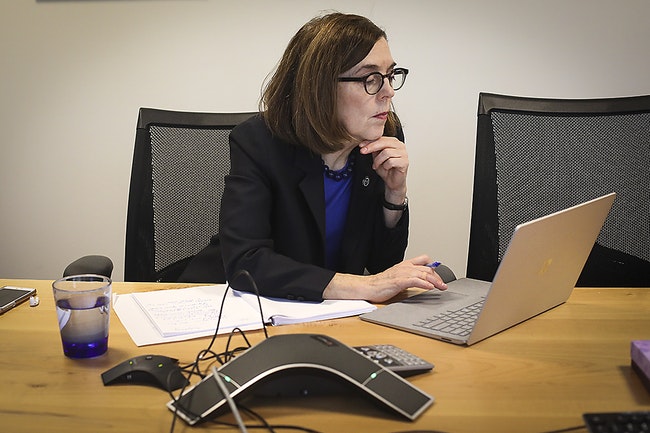 Gov. Kate Brown listens to an update from the state Employment Department during a revenue briefing on Monday, April 20. (Amanda Loman/Salem Reporter)
Gov. Kate Brown listens to an update from the state Employment Department during a revenue briefing on Monday, April 20. (Amanda Loman/Salem Reporter)
Oregonians wanting to reopen businesses and churches scored a legal victory on Monday when a judge threw out orders issued by Gov. Kate Brown in response to the COVID-19 pandemic.
The ruling suggests Oregon is now open for business with no restrictions on business conduct or citizen behavior. But that may not last long after Brown promptly appealed the decision to the Oregon Supreme Court and asked that it leave her sweeping orders in place.
The injunction issued by Baker Circuit Court Judge Matthew Shirtcliff on Monday, May 18, took aim an executive order issued by Brown on March 8 declaring an emergency in response to the outbreak. Shirtcliff determined that order had been in effect longer than the 28 days allowed by law and was “null and void.”
Subsequent orders issued by Brown that have disrupted daily life were also invalid because time had run out, he ruled.
DOCUMENT: Judge’s order.
The lawsuit was brought on behalf of 10 churches across the state by the Pacific Justice Institute, a religious freedom advocacy group which argued that the order violated their constitutional rights. Kevin Mannix, a Salem lawyer long involved in state politics, later joined the lawsuit on behalf of businesses across the state arguing that they had been harmed by the orders.
Shirtcliff agreed, writing that they had experienced “irreparable harm.”
He said that Brown had the authority to restrict business and by law had “power over the movement and gathering of citizens.”
He based his decision on a particular law that said the governor’s executive orders in a public health emergency could be in place for a limited time.
“The executive order became null and void beyond the maximum 28-day time period,” he ruled.
By the ruling, that means Brown’s primary order lost effect in early April.
The judge said that the churches had established they would be “harmed by a deprivation of the constitutional right to freely exercise their religion.” He said the business leaders suing Brown also “have also shown great economic harm to their businesses and their ability to seek a likelihood.”
“Praise God, the judge made the right decision here,” said Ray Hacke, an attorney with the Pacific Justice Institute who argued the case.
Brown’s orders have prompted protests at the Capitol and an outdoor church service on the Capitol steps last Sunday that drew an estimated 400 people worshippers.
Hours after Shirtcliff ruled, the state Department of Justice, acting on behalf of Brown, appealed the ruling the Oregon Supreme Court. The filing argued that the governor has adequate authority, that the judge relied on the wrong law and that the injunction risked lives.
The state asked that the governor’s orders be left in place while the high court considers the appeal.
“It is irresponsible to dismiss the health risks and science behind our measures to stop COVID-19,” Brown said in a statement after the ruling. “We would be faced with the prospect of another mass outbreak without the tools that have proven to be effective in protecting our friends, families, neighbors, and loved ones from this disease.”
The legal fight is unfolding as the governor’s plan to begin gradually reopening the economy is underway and restrictions for businesses in 33 counties have been relaxed. It’s not clear when the Supreme Court will act, but the judge’s decision means that Brown’s restrictions have been suddenly lifted for the entire state.
“The tables have been turned,” said Mannix, during a press conference on Monday.
Mannix stressed that people should still take precautions in response to the outbreak, especially in hard-hit areas. But he said that statewide orders restricting the ability of people to go to a church or the barber went too far, considering that rural counties have far fewer cases of COVID-19. Mannix said that such decisions are better left to county governments.
The complaint was filed on May 6. Mannix later joined the complaint representing additional businesses and churches.
Court filings described how businesses have had to lay off employees and reduce service in response to the governor’s orders. They also describe how disruptive the order has been, canceling Bible studies, weddings, baptisms and other services. The complaint also pointed out that churches and businesses risked criminal liability for violating the order.
Scott Erickson is the lead pastor at Salem’s Peoples Church, which participated in the lawsuit. He said that the church respects the governor but disagrees with her. Erickson described how he’s seen large numbers of people at big box retailers during the pandemic and questions why churches can’t also meet.
Erickson said that during the pandemic, church meetings and services have moved online. On Sunday, the church holds drive-in service, where congregants park in the church parking lot and listen to the service on the radio. He said that the drive-in service is not the same.
“When you are in God’s presence and able to worship, there is something special about that atmosphere,” he said. “And when you can’t be together in that kind of moment you miss the opportunity to feel God’s presence.”
But even if the governor’s order are in fact erased, Erickson said church services won’t revert to how they were. He said the sanctuary can seat 1,100 people but will only allow 550 to maintain social distancing. The church, which has 3,700 regular attendees, offers multiple services on Sunday to accommodate those who attend, said.
Erickson said that services inside the church won’t resume right away even if the order is lifted to allow for increased cleaning and other measures.
DOCUMENT: Appeal filing.
In Supreme Court court filing, Benjamin Gutman, an assistant attorney general representing Brown, argued that the governor relied on provisions of Oregon law for her order that don’t expire. He further argued that the churches and businesses are not “irreparably harmed” by the orders.
“They remain free to engage in other activities, including holding worship services and other religious ceremonies in small groups or (sic) though other appropriately distanced means, such as online or drive-in services,” he said.
Gutman added that lifting the order “threatens to squander the enormous sacrifices Oregonians have made over the last two months to protect the public health.”
Contact reporter Jake Thomas at 503-575-1251 or [email protected] or @jakethomas2009.
SUPPORT SALEM REPORTER’S JOURNALISM – A monthly subscription starts at $5. Go HERE. Or contribute to keep our reporters and photographers on duty. Go HERE. Checks can be sent: Salem Reporter, 2925 River Rd S #280 Salem OR 97302. Your support matters.









